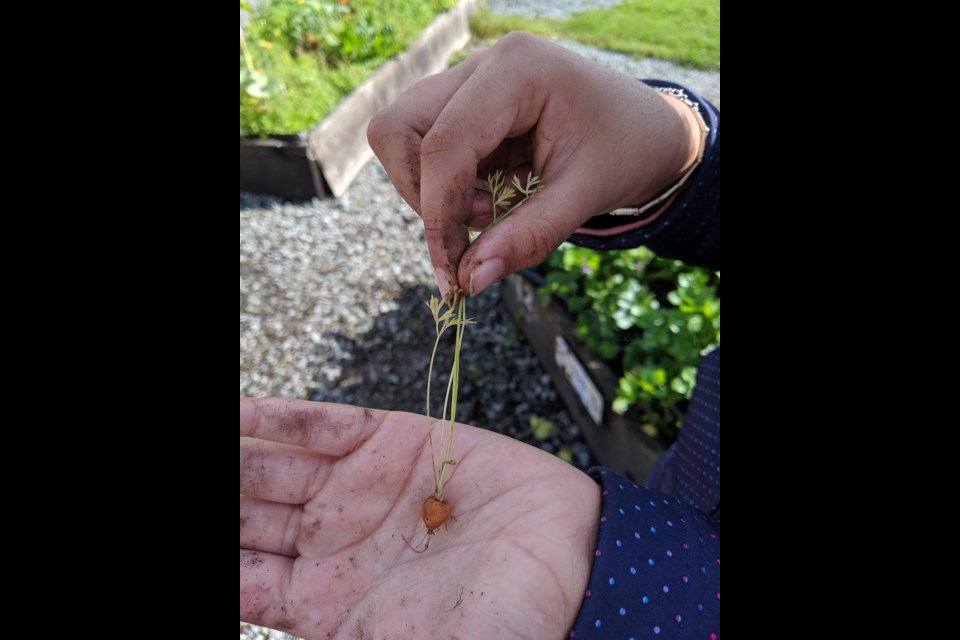There's not much sweeter than tiny little hands in the dirt of their very own garden.
But what if you don't have a backyard or the knowledge and experience to plant your little’s first garden?
Not to worry.
Constance Cope, of , breaks down what you need for a planter garden that can be placed on a condo deck.
And it doesn't require mom and dad having green thumbs.
The most important — er — rule of thumb, is that this activity, or any gardening, be something enjoyable, Cope stressed.
"Don't be worried about doing the right or wrong thing because gardening is really all about experimenting and enjoyment. And even if you don't end up eating anything that you grew, as long as you learn something and enjoy yourself along the way," she said.
Here's what you need
Soil and a container
Cope says that she goes to in Squamish, on Queensway, but local hardware, big box stores, or even grocery stores may have supplies that will do just fine.
If possible, start with a bag of good soil, such as, which has more organic ingredients to provide a natural source for fertilizing versus chemical-based fertilizers found in run-of-the-mill potted soil.
"Your soil is the foundation for healthy plants, so something might seem a bit more expensive, but you're going to have better results," she said.
For the container, a variety of gardening containers can work — remember, don't stress about getting things perfect — but Cope has used cloth containers, also from Pacific Northwest Garden Supply, and found they worked well.
"They're easy to move around — different sizes. And you can empty it and put it away for the winter if you wanted to," she said. "You can literally grow in anything — you could grow in a reusable shopping bag, you could grow In a yogurt container or an old sink."
Plants grow best with a minimum of eight inches of soil.
"The smaller the container, the smaller your plants will be. So, give them more space, and they have more ability to grow to their full potential," Cope said.
Seeds/plants
In terms of buying seeds, there are plenty of packets found at many retailers around town.
The , at the public library, has great seeds. It costs $5 for membership.
[Squamish CAN is running its Seedy Saturday on March 5 this year online and at Brennan Park in the Stawamus Chief Activity Room. Find out more at the Facebook page.]
Cope says when it comes to what to plant with children under five years old, the bigger the seeds the better.
"Because it's easier for them to see and hold," she said.
She suggests a snap pea, which is also known as a sugar snap pea.
Kids can also have fun planting beans.
"They come in so many different colours," Cope said. "Just growing them to harvest the beans and dry them, you get this beautiful, like rainbow colours."
Cucumbers, such as the patio snacker kind, work well with kids too, as does squash.
Though they have smaller seeds, lettuce is another option, such as jester lettuce, which has pinky-purple dots all over them.
Children often will eat homegrown lettuce, as opposed to store-bought, because it tastes so much more flavourful when homegrown, Cope noted.
Folks often want to grow carrots from seeds, but they are hard to grow and take a long time, she said.
There are two possible carrot options to consider, however.
"Two varieties you could look for are called Paris market, which is a small round carrot, and little fingers, which also is a good smaller carrot that matures more quickly," she said.
Sunflowers are a tried and true favourite with kids, too.
For something a little different, edible flowers, such as nasturtiums or calendula, are fun to plant too, Cope said.
If you want to plant from seed, that is great, if some of the plants fail or if they die when you put them outside, just go and buy some transplants.
Local big box stores will have some "starts."
And starts are available at the annual Squamish CAN plant sale at Mamquam Elementary on May 1.
Brackendale's own also annually sells starts. (Watch their Facebook page for details about pop-up markets.)
When to plant
For the plants to be successful, wait until the weather warms up consistently to put the containers outside.
May long-weekend — May 21st weekend — is a typically safe time to plant.
"If you have space to start things inside earlier, that's great. All the seed packets will have instructions on when to start them."
No special gardening tools are needed.
Time to plant
With your container, soil and seeds, now it is time to plant.
"Fill your container with soil, give it a little bit of water before you plant your seeds," Cope said.
"A general rule of thumb for seeds is planting it twice the depth of the size of the seed. A smaller seed goes really shallow."
Give the seeds a light water and put the container somewhere warm.
Most plants germinate best at around 20 C. And they don't need light to germinate.
"Once they're out, then they need light. And the more light you can give them, the better — typically that would be south facing," Cope said, but added if that isn't possible, just find the brightest spot.
Over something like a cucumber seed, a pop bottle or milk jug overtop can create a mini-greenhouse, Cope said.
In terms of watering, the soil should be kept moist — not too wet or too dry.
Find out more about gardening and more at .



